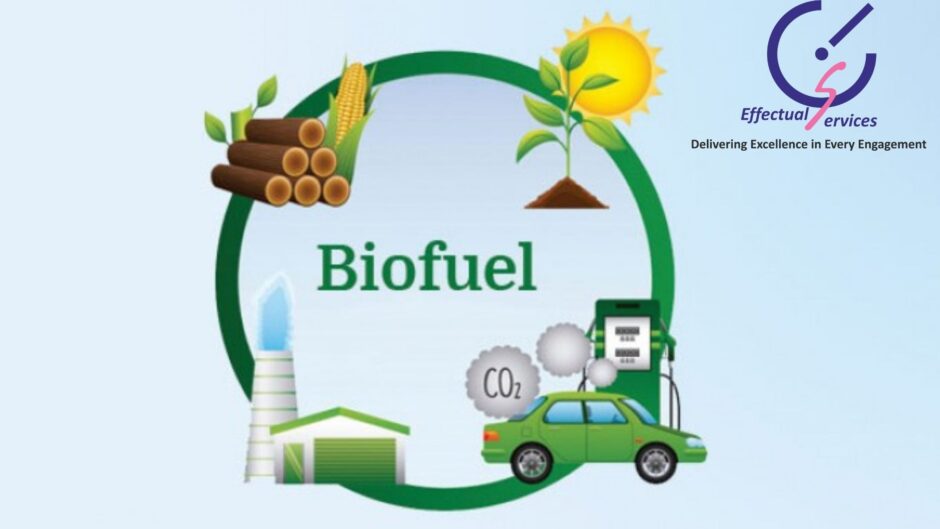Biofuel Significance and Market Overview

Biological material is an alternate to produce renewable energy called Biofuel. Biofuel offers a possible alternative to petroleum-based fuels or fossil fuels. The explosive and healthy growth in the biofuel market has constantly been catching eyes over the past decade. The main goal to embrace biofuel is to break the rusty chain of environmental pollution and importing oil adding to the county’s economy, subsequently, it will lend an eager hand in replacing the dependency of nonrenewable resources, mitigating greenhouse gas (GHG) emissions, and patronizing economic development. Biofuel is playing a significant role in sectors like aviation, navy or maritime transportation, etc. which is leading to expansion in consumer demand. A glimpse of biofuel advancement is started from corn starch, sugarcane, rapeseed, soy, etc. as a first generation biofuel, and followed by non-lignocellulose feedstock as second generation biofuel. Feedstock such as Jatropha oil (third-generation biofuel) and genetically modified microorganism (fourth-generation biofuel) are trigger point in cutting edge technology for increasing the biofuel production. Overall, the third and fourth generation biofuel technology will unlock an opportunity to bring forth a large-scale production potential across the globe. The article will be witnessing the curve of market outlook and forecast, Jurisdictions ladder, competitive landscape in the biofuel market.
The global biofuel market spike has been predicted to jump up at an approx. rate of 2.24 percent over 10 years between the years from 2016 to 2026. Accordingly, an estimation to touch USD 11.59 trillion by the year 2026 owing to the hint of how it will be rapidly growing. Feedstock like coarse grain and vegetable oils are expected to be highly used in biofuel production. The global consumption of biofuel reached about 153.4 billion per liter in 2016, further it has been projected to increase modestly by the period of 2026, which might be around 173.5 billion per liter at the growth rate of 1.2 percent. Factors strengthening biofuel market are:
- Biomass-based fuels for transportation has a great potential to cut down on emissions produced by vehicles
- Price is lower than any other nonrenewable resources
- Sustainability in biofuels as their various uses or applications have increased for the past years as a way to increase energy self-sufficiency
- Reducing net trade costs, biofuels is getting a grip on several industrial sectors.
The eye-catching healthy rapid growth has become the strategic focus for many business firms for gaining profits over the past decade. It can be noticed the concrete proof of a drastic increase in the biofuel market in terms of its use in aviation, marine transport domains.
Sustainable fuel mostly drives the demand for bioenergy in the transportation domain across the world. It has been studied that biofuel consumption in most of the countries will be interlinked to local or domestic demand. Additionally, in regards to Biofuels Renewable Energy Directive, the policy framework in the European Union has already mentioned that the consumption of renewable energy including non-liquids would jump up to 10 percent of total transport fuel consumption in 2020 on an energy equivalent basis. Also, as per Fuel Quality Directive, fuel producers would require to reduce the greenhouse gases (GHG) intensity of transport fuels.
Europe is continuously holding the top position in biofuel production, while on the flick side, the US is capitalizing on a great deal of raw material availability and playing a dominant inning in the market. The two countries – US and Brazil are the key ethanol suppliers. Brazil is emerging as the main producer of biofuel energy followed by Argentina and Indonesia showing prominent growth. The policies in all these countries influence the biofuel production patterns.
In the European market, biodiesel rules the fuel segment. The biodiesel is certainly preferred over ethanol, diesel and petrol due to the existing energy taxation policy, which brings about a heavy dependence on biofuel indicating around 70 percent of its transport fuel market. Therefore, biodiesel accounts for 80 percent whereas ethanol stands at 20 percent of the biofuel market. Europe, the leading producer of biodiesel, is constantly tightening the grip on the biofuel market among the key players like Brazil, the US, Argentina, and Indonesia. In the current year 2020, European biodiesel production has been expected to have a substantial rise in production.
The leading US biofuel market is expected to be growing at a rate of 4.6 percent and will reach around USD 7336 billion by the end of the year 2026. The industry analysis reports portrayed a different picture, it is speculated that the US market might not come to amply fulfill the biofuel requirement, and the compliance gap could stand out till the year 2030. The US lays great emphasis on the EISA (The Energy Independence and Security Act) Renewable Fuel Standard (RFS) policy. The policy aims to boost the required volumes of renewable fuel being used in vehicles.
Major key players like GEVO, POET, DuPont, Neste, and Bluefire are producing biofuel to fulfill the global demand of fuel. Australia based Algae Tec company cultivates algae for the production of biofuel, for which the company is using marginal land or industrialized locations. Furthermore, it is more productive as oil and hydrocarbons per landmass than any other terrestrial crop. The US based company Butamax Advanced Biofuels has invented bio-isobutanol production technology with reduced production cost in order to provide a high-value drop-in biofuel for transportation fuel supply.
Recent patent filing trends support the market growth of biofuel, wherein patent filing originating from European countries take first place across the globe, followed by US. Also, it has been noticed that innovation is more focused on genetic development for enhanced biofuel production through using different microbial strains. Apart from the genetic development, other secondary areas of innovation cover enzymatic hydrolysis process, waste to biofuel, etc.
In conclusion, it seems biofuel is emerging area that will lead automotive and renewable energy sector. Biotechnological advancement, waste management, strict environmental regulation for gas emission, high demand of electric vehicle, rise in patent activity are the key driving factors that will support the biofuel market to tremendously grow in near future.
Solutions Driving Innovation & Intelligence
Enabling Fortune 500's, R&D Giants, Law firms, Universities, Research institutes & SME's Around The Globe Gather Intelligence That
Protects and Nurtures Innovation Through a Team of 250+ Techno Legal Professionals.


